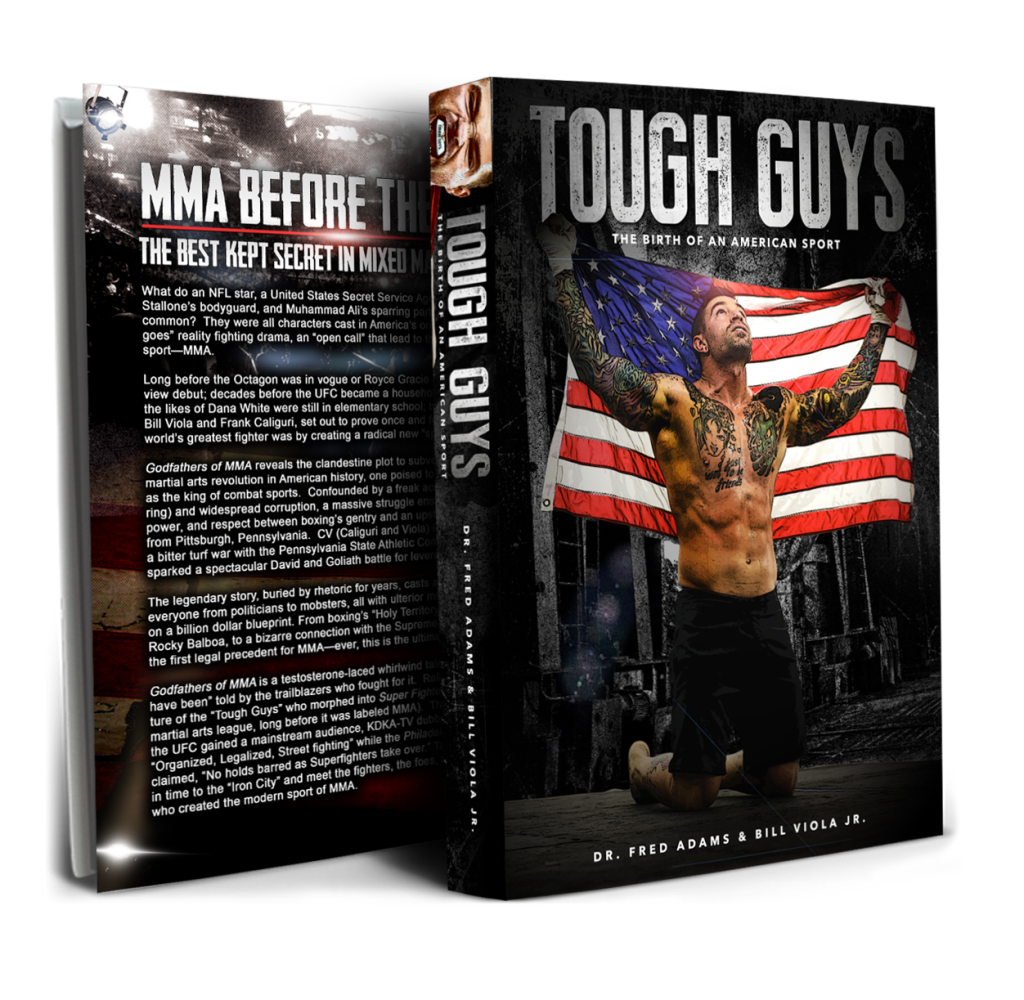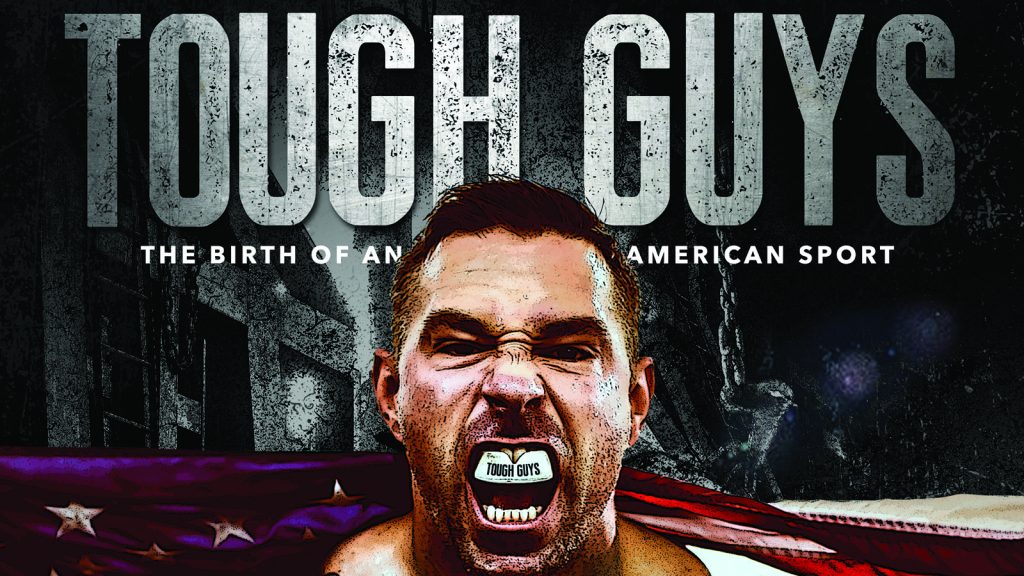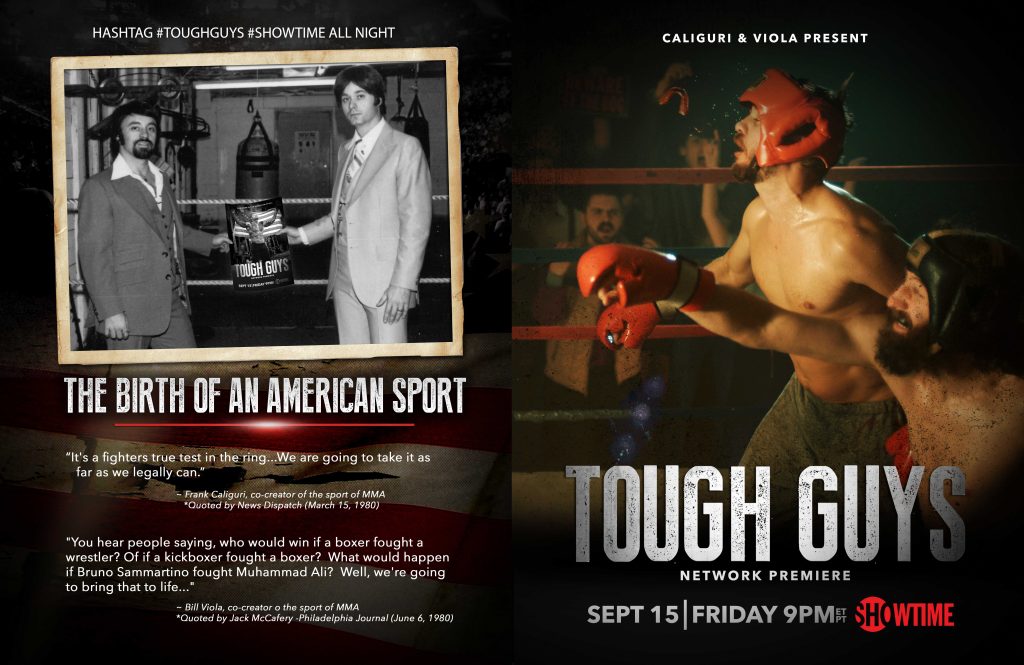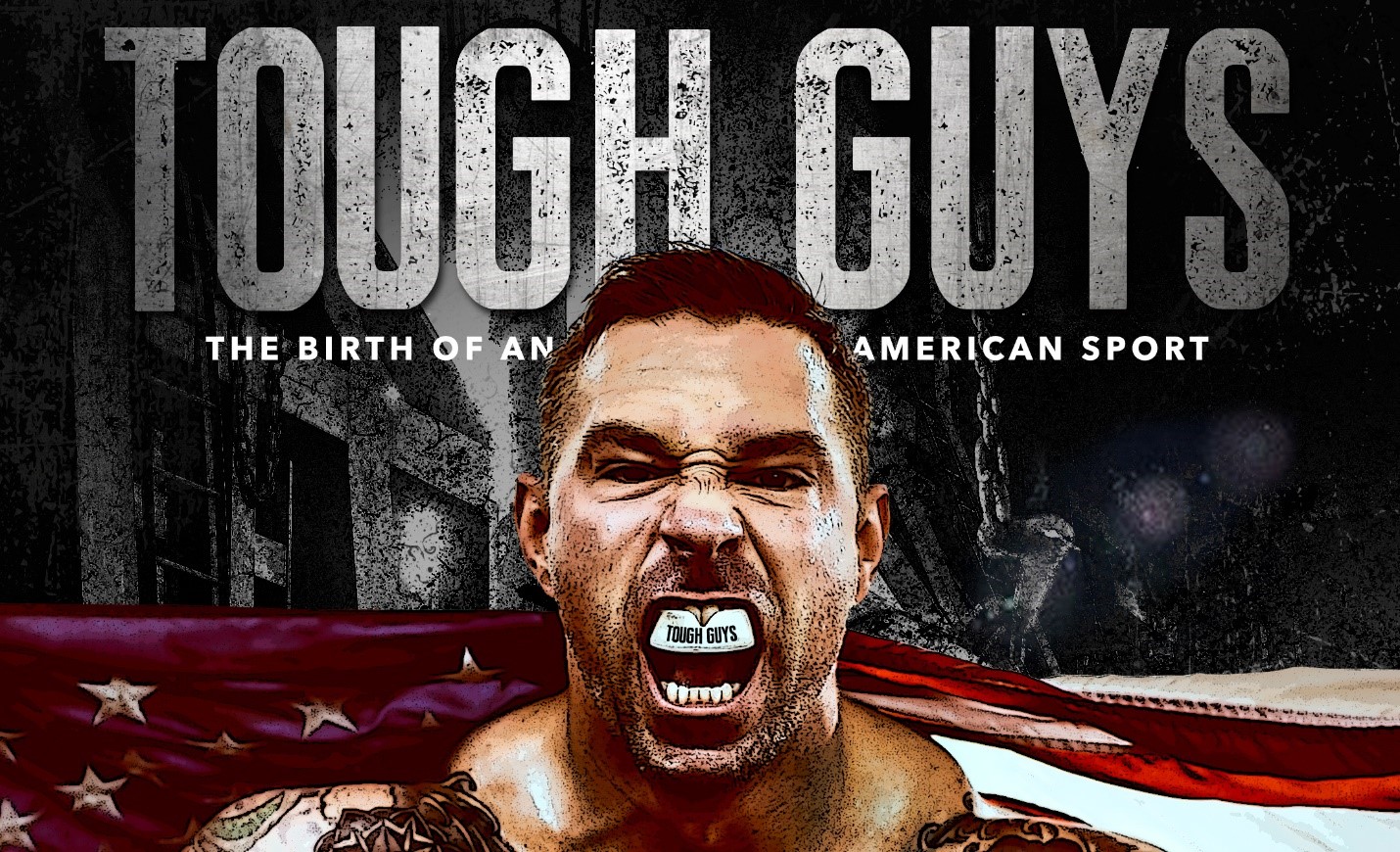Best selling MMA History Book topping the Mixed Martial Arts Charts on Amazon
Showtime documentary proves Pittsburgh-area early mixed martial arts fighters were ‘Tough Guys’
 Sept. 15, 2017 -Maria Sciullo (Pittsburgh Post-Gazette)
Sept. 15, 2017 -Maria Sciullo (Pittsburgh Post-Gazette)
Google the “history of mixed martial arts.” Sometimes, the name of action star Bruce Lee pops up. Other times, it might be Art Davie, who created the Ultimate Fighting Championship in 1993.
But for practical purposes, a couple of guys from the Pittsburgh area got there first.
At 9 p.m. Friday, Showtime will premiere “Tough Guys,” a documentary feature that revisits the “City of Champions” era — one that spawned a series of streetfighter-type competitions.
In spirit, if not legally, it was the grassroots beginnings of MMA.
“For me, growing up in the ’80s in Pittsburgh, I had no idea any of this existed,” said Craig DiBiase, a Peters Township High School grad and producer of the film. His New York-based MinusL production company financed “Tough Guys,” and one of its directors, Henry Roosevelt, co-directed with William Zullo.
“Tough Guys” is a sideburn-wearing stroll through the evolution of bikers, bouncers and steelworkers brawling for cash, honor and the sheer thrill of beating each other up.
At the beginning of the film, karate promoters Bill Viola, who grew up in Brownsville, and Frank Caliguri, of Arnold, talk about the night they laid the groundwork for their tough guy competitions.
“Some great ideas start in laboratories. Some start in classrooms. But ours started at America’s diner: Denny’s,” Mr. Viola said.
They’d seen all sorts of bar fights and, as martial arts experts, were familiar with various forms of self-defense. What might happen if you put boxing, wrestling and martial arts together? Even better, what would happen if the participants were amateurs, fighting mainly for pride and street cred?
Would anyone come to watch? Resoundingly yes: more than 3,500 fans crammed the 2,000-seat ballroom at the New Kensington Holiday Inn.
Mr. Viola and Mr. Caliguri put up posters recruiting “tough men” to compete in a three-day event beginning March 20, 1980. With $6,000 in prize money available, the response was great. Three secretaries were hired to handle the flood of entries.
“In the late ’70s and early ’80s, ‘Rocky’ was the biggest movie out,” Mr. Viola said. “Everyone was listening to the song [‘Gonna Fly Now’], drinking eggs in the morning
“He was fictitious, but we were going to have the real ‘Rocky.’ ”
These were fighters like Dave Jones, a kickboxer and road laborer; Mike Murray, a car salesman, and Danny “Mad Dog” Moyak, a construction worker with a wild Charles Manson beard.
“A lot of them were from the New Kensington area, real streetfighters,” Mr. Caliguri said. “When we put the word out, they came.”
“Tough Guys” competitions had a loose set of rules (no eye-gouging, biting or “kicking anyone in the jewels”). Knocking out your opponent helped get you to the next round.
Competitors wore boxing-style headgear as well as padded footwear and gloves for safety. That didn’t entirely prevent injuries: one, Frank Tigano, a steelworker from Braddock, broke his jaw but still competed the following month.
There would be other, bigger events, such as the regional finals at the old Stanley Theatre in Downtown Pittsburgh, now the Benedum Center. But according to the film, death in the ring involving a rival promoter’s event would lead to Pennsylvania legistlators banning the sport.
Based on a story idea by Robert Zullo, a former Pittsburgh Post-Gazette writer, “Tough Guys” was shot in Pittsburgh and the surrounding area, as well as parts of New York and New Jersey.
Many of the fighters were not only tough, they were survivors who seemed happy to tell their stories on camera. In addition to archieved footage of the fights and promotions (remember Liz Miles and Dave Durian on “Evening Magazine”?), there are re-creations of certain scenes that brighten the look of “Tough Guys.”
“We played a little with the narrative,” Mr. DiBiase said. “We made it fast-paced; there’s never a lull.”
 Besides Mr. DiBiase, at least another key player in making the documentary has Pittsburgh ties. Brad Grimm, director of photography, is a Monroeville native working in New York City.
Besides Mr. DiBiase, at least another key player in making the documentary has Pittsburgh ties. Brad Grimm, director of photography, is a Monroeville native working in New York City.
Robert Zullo, father of the writer and director, even played Monroeville’s legendary boxing promoter Al Monzo in one re-creation scene.
Executive producers include Morgan Spurlock (the Oscar nominated “Supersize Me”) and Ross Kauffman (who won an Oscar for “Born Into Brothels”).
“Tough Guys” had its cinematic debut in June, when it played to a sold-out crowd at the American Film Institute’s Docs festival. A free, public showing is set for 9 p.m. Friday at the Palace Theatre in Greensburg.
In an early scene, Mr. Jones, the kickboxer, is duking it out with Mr. Murray, the car salesman. Reeling, Mr. Jones tucks into the corner, but it seems he’s just playing possum. As his opponent moves in for the kill, Mr. Jones gives him a vicious kick to the chest and wins the match.
“The MMA,” he said, “was born right then.”
Maria Sciullo: msciullo@post-gazette.com or @MariaSciulloPG.
‘Tough Guys’ traces MMA’s roots right back to Western Pennsylvania
 Sept. 12, 2017 -Joanne Klimovich Harrop (Pittsburgh Tribune-Review)
Sept. 12, 2017 -Joanne Klimovich Harrop (Pittsburgh Tribune-Review)
This is the real story.
Two guys from Western Pennsylvania — Bill Viola Sr. and Frank Caliguiri — created the sport of mixed martial arts, now a billion-dollar business, years before it became a household name.
That tale has been documented by Bill Viola Jr. in the book “Godfathers of MMA,” which he co-authored with his cousin Fred Adams. The local connection to this sport will receive even more exposure in the documentary “Tough Guys,” which airs at 9 p.m. Sept. 15 on Showtime. The network broadcast premiere of the film will be shown at a free event Sept. 15 at the Palace Theater in Greensburg. Seating is on a first-come, first-served basis
Viola Jr., 40, from North Huntingdon — who operates Viola Karate the same dojo his father founded in 1969 (then known as Allegheny Shotokan) — served as producer of “Tough Guys,” which features the origins of the MMA fighting phenomenon. The movie premiered June 15 at the AFI DOCS Film Festival in Washington, D.C.
The reason the younger Viola decided to write about his father and Caliguiri was because MMA was getting more popular and he didn’t want the true story to be lost.
Viola Sr., 69, a Brownsville native who lives in North Huntingdon, and Caliguiri, 68, from New Kensington, met through karate and have been friends a long time, Viola Jr. says. They are proud of what they started long ago.
“It’s surreal to have this journey played out on television,” says Viola Sr. “We created a new sport, and even if we don’t have the reins anymore, I’m proud of how popular MMA is today.”
Here’s how the story goes, Viola Jr. says.
His dad and business partner Caliguiri were successful in martial artists and promoted karate and kickboxing. They came up with the idea of a mixed martial arts event. They developed an even playing field where the guys could “settle the score,” so to speak, via a competition called Tough Guys. At one point, they held a finals match in the former Stanley Theater in Pittsburgh.
“It just took off,” Viola Jr. says. “It was something no one had seen before, and it was fresh and exciting — a sport that had never been done before. They gained so much attention but got an enemy in boxing, which was struggling.”
As this mixed martial arts was on the upswing, the State Athletic Commission, which oversaw boxing, stepped in and ended the competitions. After a man was killed in Johnstown — in an event not sponsored by Tough Guys, but with a similar name — it was outlawed, Viola Jr. says.
In 2009, the ban was lifted and MMA became legal.
“It was hard for my dad to swallow — he had the idea, but he wasn’t one to talk about it,” Viola Jr. says. “It is a sad thing it happened, so I took it upon myself to tell the story. I don’t want history to be lost. Pittsburgh could be losing an important part of its history.”
That legacy is being preserved in an exhibit at the Senator John Heinz History Center in the Strip District. The film came into being after producers from MinusL Productions in New York City saw the history center exhibit. They teamed up with an Academy Award-winning team, including Morgan Spurlock (“Super Size Me”), to produce the film and brokered a deal with Showtime to broadcast, Viola Jr. says.
“It is great to meet the people who are a part of this, and for them to see it come to fruition,” says Anne Madarasz, director of the Western Pennsylvania Sports Museum and chief historian for the history center. “They kept so many pieces of memorabilia from tickets to uniforms to photographs to posters that it has made for an amazing exhibition. Their story has merit, and it’s credible, and it needs to be told. It’s a ‘wow’ kind of moment for people who see it, and with the film coming out, it will create more attention.”
She says now MMA is a big-time sports business, but when Viola Sr. and Caliguiri started they had hoped to promote the event and grow it, but then the state stepped in.
“There were things that happened that were out of their control,” Madarasz says. “There are a lot of different factors. The sport is huge on TV — which changes the landscape of a sport — taking it from a neighborhood and community sport to an across-the-world sport.”
The documentary is the combination of a lot of the original fighters and guys who took a chance to enter the ring, Viola Jr. says. They came from all walks of life. There are re-enactment scenes by professional actors. The timing is perfect for this, says Viola Jr., because it’s coming off the recent fight between Floyd Mayweather and Conor McGregor in Las Vegas which created a lot of interest. There is an Ultimate Fighting Championship on Sept. 16 at PPG Paints Arena in Pittsburgh, where top middleweight contender Luke Rockhold faces David Branch.
“Contrary to popular belief, the sport of MMA didn’t begin with the UFC in 1993. It was born in Pittsburgh between 1979-83. They were the pioneers,” says Viola Jr., who also is producer of the Kumite Classic the mecca for martial arts in Pittsburgh since 1999.
Details: godfathersofmma.com
JoAnne Klimovich Harrop is a Tribune-Review staff writer. Reach her at 724-853-5062 or jharrop@tribweb.com or via Twitter @Jharrop_Trib.
‘Tough Guys’ documentary sheds welcome light on forgotten MMA tourney that pre-dates UFC 1
 Sept. 15, 2017 -Mike Chappetta (MMA Fighting)
Sept. 15, 2017 -Mike Chappetta (MMA Fighting)
Like anything wildly successful, mixed martial arts has an origin story that will always be in some dispute. While the most commonly told history of the modern sport involves Art Davie, Campbell McLaren and the Gracie Train, there are countless mixed style matches such as Muhammad Ali vs. Antonio Inoki that pre-date the inaugural UFC event.
Among the most forgotten and the closest in both date and resemblance to UFC 1 is a promotion that was both wildly successful and short-lived.
On March 20, 1980, in blue-collar New Kensington, Pa., karate enthusiasts Bill Viola and Frank Caliguri produced an event that invited martial artists of all styles to compete against each other in a tournament designed to determine the most effective fighting style. That little-explored show is the subject of a Showtime documentary, Tough Guys, which premieres on Friday at 9 pm ET/PT.
Directed by W.B. Zullo and Henry Roosevelt, and executive produced by former Academy Award nominee Morgan Spurlock, the 77-minute film casts a rightful spotlight on an event and participants that deserve a chapter in MMA’s history book.
“I think in watching this, you’re very much in Frank’s and Bill’s corner because what they were creating back then, almost 40 years ago, was remarkable,” Spurlock told MMA Fighting. “I think whenever people watch Tough Guys, they leave going, ‘Man, I had no idea.’ Most people think MMA started with UFC in 1993. But these guys had an idea that preceded it by 12 or 13 years. I think you start to see there was already this idea out in the universe, out in the ether, and they pulled it off more than a decade earlier.”
Spurlock, best known for the documentary Super Size Me and the immersive CNN series Morgan Spurlock Inside Man, has long been a fan of combat sports including mixed martial arts, and recounted a story of attending a Toughman contest in Beckley, W.V., as a 12-year-old, hearing the sharp crack of a punch to the jaw for the first time.
Presented the opportunity to work on this film, he immediately saw a through line from those early days to the multi-billion dollar business the sport has become.
Tough Guys is notable not just for its forgotten slice of history, but for its characters. The promoters Viola and Caliguri naturally complement each other, the former charismatic and verbose; the latter stoic and reserved. The competitors—amateurs with names like Danny “Mad Dog” Moyak, Michael “Mex” Lubiano and “Crazy” Jack Reynolds—have aged, but their fighting spirit lights up as they dust off their memories.
The film features rarely seen footage of some of those early fights, including innovations that pre-dated modern MMA such as open-hand, curved gloves to allow for grappling. Much like UFC 1, the event was advertised as “Anything Goes,” but that was mostly a marketing ploy. In reality, there was protective gear and a host of rules including prohibitions against eye-gouging, biting, fish-hooking, and intentional evasion of contact.
While the explosive rise of the promotion is compellingly told—about 3,500 fans packed a Holiday Inn for the premiere event—perhaps more even more intriguing is its rapid decline. Unbeknown to Viola and Caliguri, a similarly named promotion—Toughman—had begun in Michigan. On the one-year anniversary of Viola and Caliguri’s first event, Toughman’s promoter Art Dore brought his show to nearby Johnstown, Pa. In their mind, Dore’s move was purposely designed to confuse the market and draw in fans who didn’t realize the difference (Dore’s Toughman was essentially amateur boxing). At any rate, during that show, a 23-year-old Marine named Ronald Miller was beaten badly and died shortly after competing.
Tough Guys, which by then had already thwarted one attempt by the Pennsylvania athletic commission to shut them down, was soon in the crosshairs of state legislators. Just over two years later, the state senate passed Bill 632, specifically outlawing “Tough Guy” contests. Despite the fact that the death occurred in Toughman, the legislature didn’t include a single mention of that promotion.
“They tried to work with the commission, but I think that back at that time, all of these athletic commissions were in the pocket of big boxing,” Spurlock said. “Boxing controlled these state athletic commissions, and I think they tried to pull it together. But once that guy got killed, it was the beginning of the end, as they were against the same forces the UFC faced back in the beginning, where they couldn’t find states that would allow them.”
Whether the commission conspired with legislators to bait and switch the promotion’s name is unclear. The documentary includes interviews with at least two politicians who suggested everything was done with integrity and that they were using “Tough Guy” as a general term. Former Senator Bob Mellow, who drafted the bill, said Tough Guys promoters deserve some of the blame for failing to make their own legislative proposal or coming forward when the legislation was going through assembly.
What might have happened if they embraced regulation? To that, one can only wonder. As it stands, the legislation only affected Viola and Caliguri’s promotion while Dore’s Toughman continues to this day.
Viola and Caliguri? As they recount the ordeal, they appear content in what they did, and say there are no regrets, even if sometimes they can’t help but wonder what might have been. They are content with their only little slice of history, and the fact that now the world will know that before the Gracies, before the Fertittas and Dana White, there was Frank and Bill. There was the Tough Guys.
“I’m a real believer that there are no original ideas,” Spurlock said. “When you have an idea, somebody else in the world has had it, or might have it, and there is a race to see who can pull it off first. Who can do it better, faster, quicker. What they did preceded what we call MMA by more than a decade. You have to give them credit for that. They teed up an idea of what it was. Maybe someone saw one of these fights, or maybe someone said ‘I can do this better,’ but you can’t negate what these guys did. They created a mixed martial arts competition before anyone else.”




